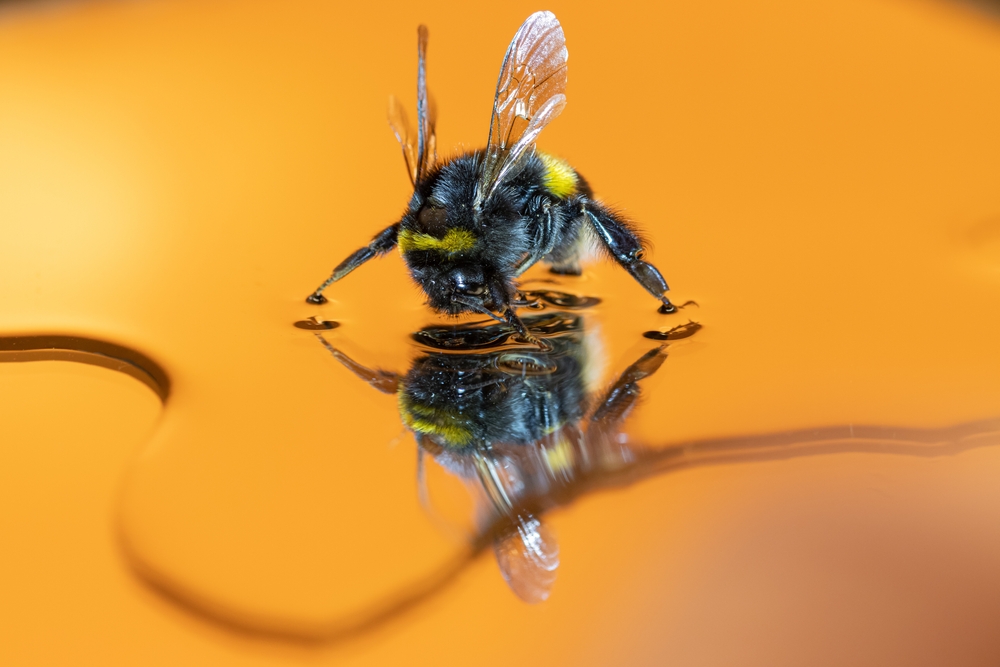Scientists discovered a surprising survival strategy used by bumblebees: the ability to survive underwater for extended periods. This incredible study gives fresh information on the endurance of these important pollinators, giving hope for their survival in the face of rising environmental problems.
Testing bumblebee resilience
Dr. Sabrina Rondeau of the University of Guelph in Canada, and co-author Prof. Nigel Raine, discovered this phenomenon following a laboratory mishap. Water inadvertently infiltrated containers housing hibernating queen bees, piqued curiosity, and prompted a thorough examination.
“We know that about a third of all bumblebee species are in decline currently [but] it’s not the case with [the common eastern bumblebee],” said Rondeau, adding that the team was eager to explore whether flood tolerance could play a part in their resilience.
The researchers carried out a rigorous experiment using 143 unmated, hibernating queens of the common eastern bumblebee, as described in the journal Biology Letters. Each queen was placed in a plastic tube equipped with a perforated lid, filled with damp topsoil, and exposed to simulated floods in a controlled environment.
After ensuring the bees were still alive, the researchers maintained 17 tubes as controls and added cold water to the remaining 126. In half of these tubes, the queen was allowed to float on top of the water, while in the other half, the bee was pushed under.
In both scenarios, a third of the tubes were left for eight hours, a third for 24 hours, and a third for seven days to simulate various flooding conditions. The team then moved the bees to different tubes and monitored them.
Insights into bumblebee physiology: survival in submersion
The study’s investigation into the physiological factors behind bumblebee resilience yielded surprising results. Despite being buried underwater for up to a week, a startlingly high percentage of queen bees survived. Surprisingly, the time of submersion had no substantial effect on their ability to survive.
The team determined that survival rates were comparable regardless of how long and under what conditions the queens were treated to. Eight weeks later, 88 percent of the controls and 81 percent of the queens that had been submerged for a week were alive.
This resilience goes beyond mere survival; it reflects a complex interplay of physiological adaptations that allows bumblebee queens to flourish in harsh conditions. Further investigation into their low oxygen requirements during hibernation could provide crucial insights into their amazing underwater endurance.
The implications for bee conservation
This revelation has far-reaching ramifications, particularly regarding climate change and its effects on bee populations. Understanding the adaptation mechanisms of bees is crucial for conservation efforts as more extreme weather events, such as floods, endanger their habitat.
Professor Dave Goulson of the University of Sussex, a leading bee expert who was not involved in the study, was optimistic about the results. He emphasized the importance of this resilience in light of mounting concerns about the impact of climate change on bee populations. “Amazingly, this new research shows that hibernating queen bumblebees are entirely unaffected by being held underwater for up to one week,” he said. “This seems to be one small aspect of climate change that we need not worry about.”
Future research: understanding the secrets of bumblebee survival
New research opportunities arise as scientists probe further into the principles behind bumblebee resilience. Investigating the physiological and behavioral modifications that allow bumblebee queens to resist submersion may yield new insights into insect survival strategies.
Rondeau and Raine want to expand their research to other bumblebee species to determine the universality of this amazing attribute. Furthermore, understanding how bumblebees negotiate flooded settings and preserve their delicate progeny provides fascinating options for future research.
Source study: Biology Letters—Unveiling the submerged secrets: bumblebee queens’ resilience to flooding











